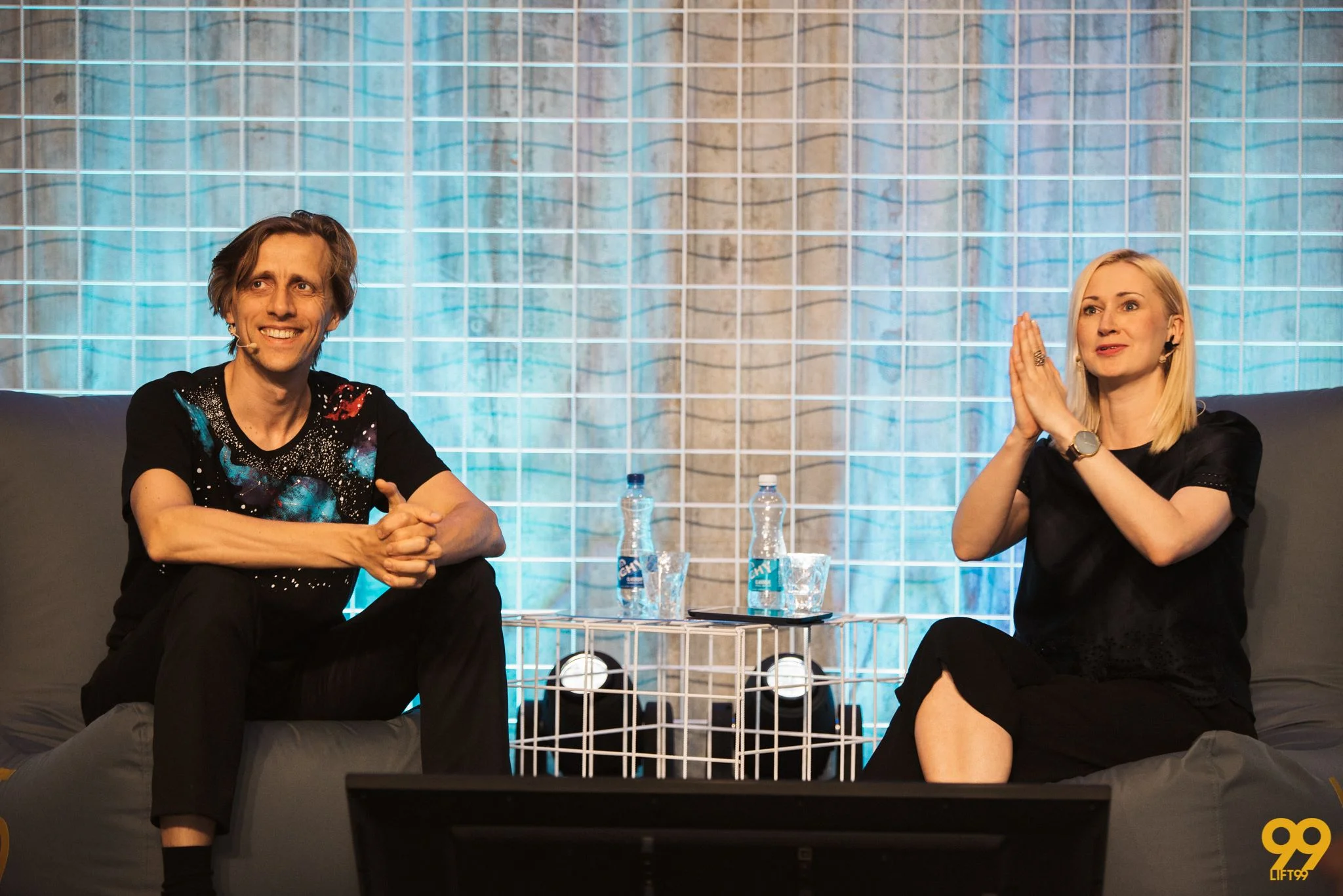The Practice and Philosophy of Building Winning Teams
- Ahti Heinla, At Startup Grind with LIFT99
Summarised by Krislin Raik and Kadri Barclay
Ahti Heinla is considered to be the grandfather of #EstonianMafia. In the last 15 years, he has co-founded several startups, amongst others Starship Technologies and Skype. We refer to him as a great example of a humble leader. We talk about how the employees in his startups never leave. We can see the spark and passion filling up the space in their offices.
The way Ahti leads his companies has developed into a kind of phenomenon that is admired by many of us. How does he do that?
Ahti Heinla and Liis Narusk, on the stage of Startup Grind
When interviewed by Liis Narusk on the stage of Startup Grind hosted by LIFT99, the very first response Ahti gave was something that seems to be absolutely fundamental to the values that he carries: the people around you matter. They matter a lot.
“The people around you matter. They matter a lot.”
Referring to the story of how Skype was created, Ahti said that the way the co-founders of Skype clicked with each other had the biggest impact on the whole development process. The key factor is how well the founding team fits together.
If the co-founders don’t have respect for each other, it’s not a good sign for success. He also mentioned that many of his co-founders and employees have either been with him through several startups, ideas or live phases - for example, his classmates. The biggest impact that a mutual history has on a team is the value of knowing each others’ strengths and roles in addition to the cumulative respect for each other.
“Respect within the founding team is crucial. It cumulates throughout projects and over the years.”
And once you have the right people around, you start looking for the ideas. At least Ahti did it in that order - team first, ideas later. There is a lot of hidden potential that needs a great dose of optimism in order to be released but any idea can be shot down with enough criticism.
When starting out with the “Let’s Do It!” World clean-up campaign, he needed to estimate how big of a project he was actually dealing with, and for that, he created his own sense of data units to estimate the amount of garbage that could be found in Estonia’s forests. And that was enough to get a better sense of the ambition that was laying in front of him.
“At the beginning, you don’t need much accuracy. Aim for 30%.”
Your employees are the very first people you need to sell your idea to. When asked why the employees in Starship Technologies are so loyal, Ahti said that the answer is obvious: “We’re building robots”. And apparently, everybody wants to build robots.
Nobody ever knocks on doors to deliver packages in sci-fi movies, so whether we realise it or not, we all know that the future belongs to robots that will do this job for us. Additionally, convincing people is an important skill that can be developed. Political talk is not useful for startuppers - your audience might simply know more about your product than you do.
“Convincing others is a skill that can be developed. Your employees are your first customers you need to sell your idea to.”
So you have your founding team, your idea, and your employees. But that’s just the beginning - how to keep going? The ones who reach great heights don’t usually compare themselves to their competitors a lot, as this can be seen as a sign of lacking confidence. What Ahti emphasizes on especially is that the importance of who are the people in your team will not dissolve when your team gets bigger - every person counts and has to be approached individually.
Ahti himself has been within the first five people in a team in almost all of his projects that he has done, but there are people who have never been within the first five. It makes a difference. But whatever the background might be, you can always choose to teach how to do better rather than point out what isn’t good enough. Positive feedback can also be used as a tool for inducing progress in the overall team. And in case you need to give negative feedback, never do it in front of other people.
"Problems should be seen as opportunities to do things better" - Ahti Heinla
At the end of the day, it all comes down to how you manage yourself. Ahti said that he has never visited a psychiatrist because of his job stress, but he has been close. There are startups that have to run a sprint to achieve their goals, while others need to run a marathon and set the right pace. If you run a marathon slowly, you will lose. However, even though the goals for this month are important, every team member is needed next month as well. The top priority is not to break yourself. Everything else will always stay secondary.
“The goals for this month are important, but we need you here next month as well.”
We are proud to say that Ahti Heinla is among the investors of LIFT99 since May 2018. He has been a big inspiration in creating the LIFT99 Skillsharing Platform for founders, and our appreciation of his advice and support can't be put into numbers.
Special thanks to Liis Narusk for doing the interview, and Ahti Heinla for sharing his insights.
P.S. Click HERE to see the live stream from the event, and HERE to see the the gallery.



